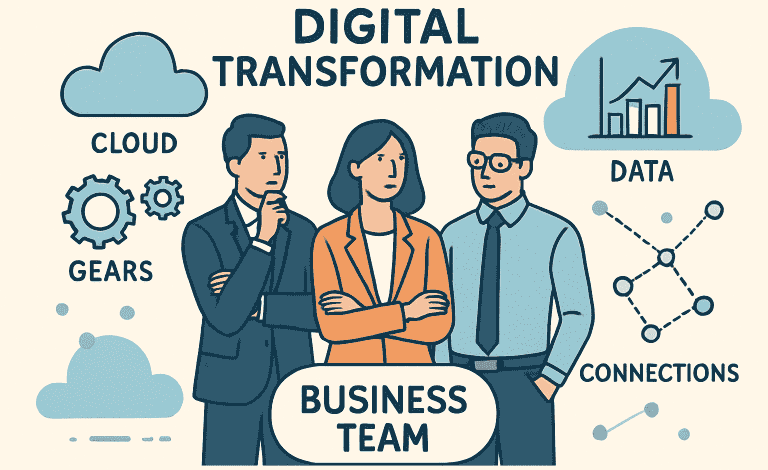Driving Digital Growth in Modern Organizations

Digital Transformation in Modern Enterprises
Modern enterprises recognize digital transformation as essential for survival, driven by the rise of digital channels and business models. Companies must overhaul technology and rethink customer engagement and differentiation. It’s about reimagining value delivery internally and externally. Guided by industry expertise, technology-driven innovation helps unlock value, optimize processes, and future-proof organizations. Digital transformation is both a growth strategy and a safeguard against obsolescence.
In an age of rapid digital change, embracing digital transformation is crucial. Technologies like automation, big data, AI, and cloud computing are evolving quickly. Forward-thinking organizations invest in these to stay ahead, ensuring their operations are agile, competitive, and responsive to market demands. Navigating this complex terrain is seldom a solo endeavor; most successful transformations require collaboration with specialized partners. For instance, SEO agencies hold a central role in amplifying online visibility, optimizing content strategies, and accelerating digital growth. These partners bring a depth of expertise that makes it possible for modern businesses to make informed, data-driven decisions and achieve measurable results from their digital initiatives.
Importance of Digital Transformation
As digitization becomes essential for success, leaders recognize that relying on outdated processes risks stagnation, lower revenue, and irrelevance. Rapid technological advances pressure all organizations, with 55% of executives noting improved customer experience after digital initiatives, highlighting tech’s impact on loyalty. Ignoring digital transformation can lead to being overtaken by tech-savvy competitors who adapt faster and capitalize on opportunities. Investing in digital skills, infrastructure, and modern processes enables organizations to innovate, respond quickly, and focus on delivering customer value—crucial for long-term success.
Leveraging Advanced Technologies
Adopting digital tools like AI, cloud, IoT, and data analytics helps organizations unlock capabilities at each stage of their value chain. AI can analyze large datasets, predict customer needs, automate tasks, and optimize resources, making organizations more responsive. Companies using these technologies are over twice as likely to achieve high digital revenue. Cloud solutions reduce costs and provide scalable, secure infrastructure, streamlining workflows and enhancing collaboration. Data analytics offers real-time insights into customer behavior, operational issues, and market trends, supporting smarter decisions, personalized engagement, and risk management. These integrated technologies boost productivity, improve customer experience, and foster digital innovation.
Building a Digital-First Culture
True transformative growth goes beyond new software; it requires an organizational culture shift. High-performing companies foster a digital-first culture that values agility, teamwork, and experimentation over the status quo. Leaders must create a culture that views change as an opportunity, empowering employees to participate in transformation and accelerate new solutions. Empowering employees with autonomy and tools to experiment and learn drives successful digital transformation, leading to higher customer satisfaction, up to 20%, and improvements in speed and agility. Promoting open communication, professional development, and recognizing innovation reinforce this culture, helping organizations pivot and seize new opportunities quickly.
Addressing the Digital Skills Gap
While investing in advanced tools is crucial, addressing the digital skills gap is equally important. Transformation projects often fail due to a lack of training, digital literacy, or resistance to change. Forward-thinking organizations are implementing upskilling and reskilling programs to update knowledge in digital tools, project management, cybersecurity, data analysis, and customer engagement—all vital for digital growth. Industry studies show that companies investing in comprehensive training are 28% more likely to succeed in transformation. A culture of continuous learning keeps employees confident and proficient with technologies that boost efficiency and innovation. Well-prepared teams enable companies to leverage opportunities, face challenges, and stay resilient in a changing market.
Conclusion
Innovative organizations embracing digital transformation are best positioned for growth, resilience, and relevance amid constant technological change. Using advanced tech streamlines operations, personalizes interactions, and allows confident pivots during disruption. A digital-first culture fosters change acceptance, encouraging creativity and improvement. Closing the digital skills gap, prioritizing learning, and forming industry partnerships build a resilient foundation for future success. Leading companies will merge innovative solutions with agile teams, transforming their digital capabilities, culture, and strategy for a digital-first era.




